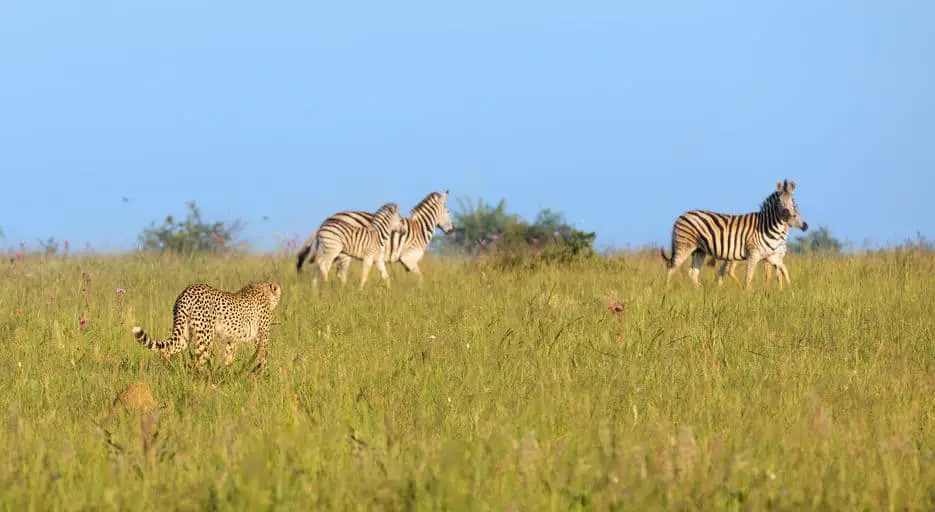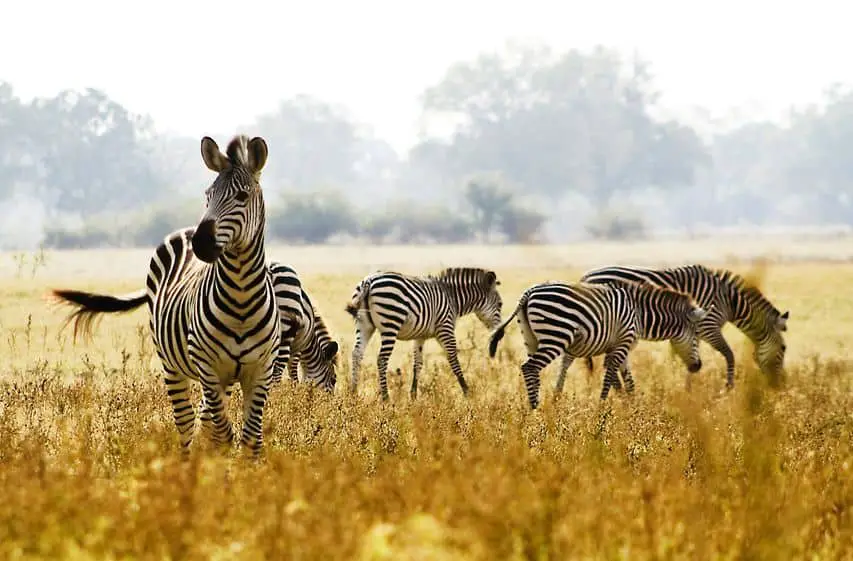Zebras are excellent at protecting themself and each other but they still have several predators that can pose a big threat to them. In this post, you will learn which African predators prey on zebras and what zebras do to reduce the risk.
Zebras’ two most common predators are lions and spotted hyenas. Less common predators include leopards, cheetahs, crocodiles, and African wild dogs. Predators will mostly hunt foal but if the opportunity strikes, they can also sometimes go after a fully grown zebra if it is by itself.
Did you know that zebras spend most of their time eating and that they are extra vulnerable to predators when they eat? Keep reading to learn who preys on zebras, why zebras are extra vulnerable when they eat, and what zebras can do to avoid predators or defend themself.

These Animals are Zebras’ Primary Predators
There are 3 species of zebras in Africa. The plains zebra (also known as common zebra or Burchell’s zebra) is the most common species and almost always the one, you will see on your safari. The two other types are Grevy’s zebra and the Cape mountain zebra (also called Hartmann’s mountain zebra).
Grevy’s zebras and Cape mountain zebras are very rare and are only found in certain parts of Africa but plains zebras are widely distributed all over eastern and southern Africa and can be found in a range of different habitats including savanna, shrubland, and grassland. Zebras are rather large animals that can weigh upwards of 900 pounds (a little over 400 kg) and for that reason, their only predators are also rather large carnivores that usually hunt in groups.
The biggest predators of zebras are lions and spotted hyenas. Less common predators of zebras include leopards, cheetahs, African wild dogs, and crocodiles.
These animals utilize different hunting strategies but one thing they all have in common is that they will always attempt to go after zebras that have been separated from the rest of their group and preferably young, old, sick, or otherwise weak zebras. The reason for this is that hunting zebras that are on their own is not only much easier for the predators but also much safer since zebras can be quite fierce when it comes to defending themselves and each other.
You will learn about how zebras defend themselves and why they can be so dangerous for predators to hunt later in this post but first, a quick look at each of the zebras’ primary predators.
Lions
Lions are the largest predators in Africa and are so powerful that they can take down a zebra on their own. They do, however, most often hunt together in groups (called prides) as this increases their hunting success rate and makes hunting much safer. A fully grown zebra can provide enough food for a couple of lions.
Spotted hyenas and African wild dogs.
Both Spotted hyenas and African wild dogs are significantly smaller than lions but they also hunt together in groups, allowing them to overpower large zebras. Both spotted hyenas and African wild dogs will also go after young zebras (ideally foal) when given the chance as they are much easier to overpower and usually provides an easier and safer meal for the hyenas and wild dogs.
Leopards
Leopards are solitary creatures that do not have the benefit of hunting in groups so hunting fully grown zebras is not really an option for them as it would simply be too dangerous. Instead, leopards will go after foal in most cases but occasionally also old, sick, or otherwise weak fully grown zebras. Leopards are experts at stealth so when they hunt, they sneak up on their target to get as close as possible, often within just 15 feet (about 5 meters), before they strike.
Cheetahs
Cheetahs are significantly smaller than lions and nowhere near as strong as leopards. Instead, cheetahs rely on speed and agility when hunting. When cheetahs hunt, it usually happens at extremely high speeds and one incredibly efficient trick cheetahs use when they hunt at these speeds is to grab their target’s legs to make them fall. Falling at such high speeds often paralyzes them briefly which is when the cheetahs go in for the kill.
Hunting fully grown zebras is still much too dangerous for cheetahs as they would risk getting trampled by the zebras. For this reason, cheetahs also usually hunt young foals.
Crocodiles
Unlike the other predators which were described above, crocodiles pose a completely different threat for zebras since they hunt in and around waterholes and rivers, making the simple activity of drinking water a potentially deadly thing to do for zebras. Crocodiles glide silently through the water and ambush their unknowing target when they get close enough. Like the other predators, crocodiles prefer foals because they are easier to kill and still provide a rather large amount of food.
Zebras are Extra Vulnerable When They Eat
Zebras spend upwards of 19 hours eating per day and since the vast majority of their food is made up of grass, they spend a large amount of their time with their heads very close to the ground. Take a look at this post if you want to learn more about what, when, and how much zebras eat.
Having their heads close to the ground significantly impairs the zebras’ ability to look out for predators and potentially puts them at great risk of being hunted.
Zebras are, however, exceptional at working together when it comes to looking out for predators and when they eat, they will usually take turns so you will often see a group of zebras where most of them are grazing and eating while one or a few others are looking out for predators. After a while, they switch so they all get to both eat and watch for predators. This behavior can be seen in the photo just below.
When they sense potential danger, zebras make a distinct noise to warn the rest of their group.

How do Zebras Defend Themselves From Predators?
As we have already briefly touched upon in this post, zebras are great at avoiding confrontations with predators and when they do encounter threats, they are great at defending themselves and each other.
Staying in groups increases security for zebras
The single most important and significant thing for zebras when it comes to defending themselves is the fact that they stay in groups. Especially plains zebras stay in groups which usually consist of 1 male zebra and 1-6 females. Staying in groups makes it much safer for them, not only because the risk of being picked by a group of predators is much lower but also because zebras have developed several strategies for protecting themselves and each other.
When a group of zebras is under attack by a predator or a group of predators, they will usually form a circle around the weakest zebras to protect them and reduce the risk of losing a group member since the stronger zebras are much more capable of defending them from predators.
Zebras also often stay together with groups of other herbivores such as wildebeests or giraffes which further increases their safety and reduces the likelihood that predators will even attempt to hunt them. Staying in large groups with different herbivores requires areas with much larger amounts of food and is not a viable option everywhere but in areas where fresh grass and other fresh, green plats are found in bountiful amounts, it’s very common to see zebras with wildebeests, giraffes, or other animals.
The stripes provide camouflage
There are many ideas and suggestions as to why zebras have their very well-known and recognizable stripes.
One of the benefits zebras are believed to gain from the stripes is that they provide camouflage which reduces the risk of being hunted by predators. This is especially relevant when they stay close together in groups as the many stripes can make it difficult for predators to distinguish between individual animals.
Zebras kick and bite their enemies
Zebras are great at avoiding danger but when a predator or a group of predators get too close, zebras also have some physical abilities that allow them to protect themselves.
Zebras can bite and kick their enemies. Their kick can be so strong that it can kill a lion.
These abilities also come into play when a male zebra is trying to overtake another male zebras’ females.
Zebras can outrun most of their enemies
Some of the animals that hunt zebras are incredibly fast. Especially cheetahs who can reach speeds of 68 mph (110 km/h) but also lions and leopards who can run 50 mph (80 km/h) and 37 mph (60 km/h) respectively can pose a big threat to zebras whose top speed is around 40 mph (65 km/h).
Despite not being able to run as fast as some of their predators, zebras can run for a significantly longer duration than the predators whose chases usually last no longer than around 30 seconds since they require extremely large amounts of energy. So if a zebra manages to avoid being caught for around 30 seconds when being chased, chances are they will get away.
Zebras have also been observed running in zig-zag to make it more difficult for predators to catch them.
In the video below, you can see how a group of zebras is putting up quite a fight when a group of young cheetahs with their mother are trying to hunt them.
Zebras Avoid Predators by Taking Turns to Sleep
Like all other animals on the African savannas, zebras need to sleep which obviously puts them at risk since they cannot look out for predators for the duration of the sleep. They do, however, have some tricks to increase their security when sleeping.
Zebras in groups take turns to sleep and there will always be at least 1 zebra awake and looking out for danger so when you see a group of sleeping zebras, there will always be at least 1 zebra awake nearby.
Additionally, zebras sleep while standing up as this allows them to take off right away without having to spend time getting up if a predator gets too close.
When they sense danger, zebras will make a distinct noise to warn the rest of the group of the threat.
If you liked this post, make sure to head over to this page where you can see all of my other posts about zebras or this page for a full list of the animals I have written about.
